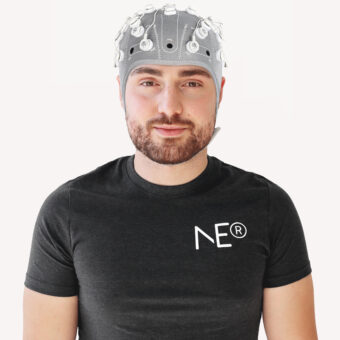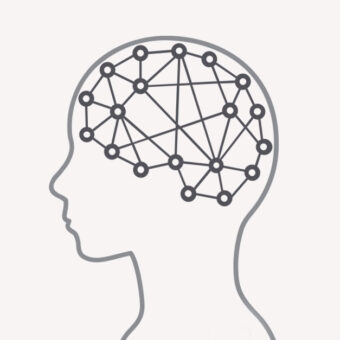It is widely known that exercise is good for the brain and body. We even have a blog post on how to keep your brain fit. But does exercise as an adult have that big of an impact on your brain? How about exercise as a child? Some researchers were curious what the early effects of exercise are on a person and how this can help mold one’s mental health at young age.
Background:
It all starts with the hippocampus, a brain region commonly known for storing long-term memories (Figure 1). This brain region is highly plastic and its volume can tell a lot about the mental health of an individual, such as memory capacity, recovery from PTSD, and serving as an early marker for dementia (Rahman et al., 2016; Apfel et al., 2011; Den Heijer et al, 2010). Recent research has shown that exercise has the potential to actually increase the volume of the hippocampus, which further supports the argument to be active (Erickson et al., 2009). However, other studies have also pointed to the hippocampus for its hand in depression. According to scientists, hippocampal volume is reduced in those with depression and this reduction persists throughout one’s lifetime (MacMaster and Kusumakar, 2004; Sawyer et al., 2012). So researchers wanted to investigate how exercise as a child, like playing a school sport, could change hippocampal volume and depressive symptoms. More generally, they want to see if exercise as a child can shape one’s mental health.

Methods:
The study evaluated over 4,000 boys and girls aged 9-11 with varying degrees of involvement in activities, ranging from team to individual sports and non-sport activities (i.e. music). In addition to having parents fill out a checklist on their child’s’ depressive symptoms, researchers also gathered MRI images of the subjects’ brains.
Results:
Researchers found that active participation in any sport – team or individual – resulted in less depressive symptoms compared to no effect in children involved in non-sport activities. However, this was only observed in boys and not girls. Additionally, involvement in sports exhibited increased hippocampal volume among both boys and girls (Figure 2). This result was only seen in children in team sports (i.e. baseball, soccer, etc.), not individual sports or non-sport activities. Therefore, results demonstrate that team-oriented sports increase hippocampal volume and reduce depressive symptoms, the latter only occurring in boys.

Discussion:
There are several important takeaways from this study, the first being that team sports seem to influence both hippocampal volume and depressive symptoms. This leads the reader to conclude that exercise from team sports as a child can help protect against depression. However, the study fails to establish any sort of causation between the variables and instead is entirely correlational. As noted by the authors, it is possible that depressed children are less likely to play sports in general. Also, it is unclear whether the growth of hippocampal volume is a result of the social or exercise elements of team sports, or a combination of the two.
Importantly, there was a difference between boys and girls regarding team sports and depressive symptoms. While researchers found reduced depressive symptoms in boys after playing sports, they failed to see any impact on depressive symptoms in girls. This could suggest that depressive symptoms in girls are a result of other factors or that girls’ association to sport involvement comes at an age outside of the 9-11 age window. This is another avenue for a future study.

So while the study illuminates a handful of interesting ideas to further investigate, there are a lot of questions left open. But in the meantime, it suggests that children between the ages of 9 to 11 should be encouraged to play team sports in some capacity to improve their mental health.
Now for us adults, if only there were a way to travel back in time…
Neuroelectrics is particularly interested in depression and how to treat the disorder without conventional medicine. We have turned towards transcranial current stimulation (tCS), which non-invasively injects electrical current through a cap one wears on his or her head. A clinical trial, lead by Cynthia Fu at the University of East London, is exploring how far this easy treatment can go in quelling depressive symptoms. And she is conducting this clinical trail with our tCS Starstim technology. For more information, check out the clinical trial here: https://clinicaltrials.gov/ct2/show/study/NCT03632434?term=A1950&rank=1
References:
Apfel B. A., Ross J., Hlavin J., Meyerhoff D. J., Metzler T. J., Marmar C. R., et al. (2011). Hippocampal volume differences in Gulf War veterans with current versus lifetime posttraumatic stress disorder symptoms. Biol. Psychiatry, 69, 541–548.
Barch, D. M., Albaugh, M. D., Avenevoli, S., Chang, L., Clark, D. B., Glantz, M. D., . . . Sher, K. J. (2018). Demographic, physical and mental health assessments in the adolescent brain and cognitive development study: Rationale and description. Developmental Cognitive Neuroscience, 32, 55-66.
Den Heijer, T., Van der Lijn, F., Koudstaal, P. J., Hofman, A., Van der Lugt, A., Krestin, G. P., & Breteler, M. M. (2010). A 10‐year follow‐up of hippocampal volume on magnetic resonance imaging in early de‐ mentia and cognitive decline. Brain, 133, 1163–1172.
Erickson KI, et al.. (2009). Aerobic fitness is associated with hippocampal volume in elderly humans. Hippocampus, 19, 10, 1030–9.
Gorham, L. S., Jernigan, t., Hudziak, J., Barch, D. M. (2019), Involvement in Sports, Hippocampal Volume, and Depressive Symptoms in Children. Biological Psychiatry: Cognitive Neuroscience and Neuroimaging. DOI: 10.1016/j.bpsc.2019.01.011
MacMaster FP, Kusumakar V. (2009). Hippocampal volume in early onset depression. BMC Med, 2004;2:2.
Rahman, M.M., Callaghan, C.K., Kerskens, C.M., Chattarji, S. & O’Mara, S.M. (2016) Early hippocampal volume loss as a marker of eventual memory deficits caused by repeated stress. Sci. Rep., 6, 29127.
Sawyer, K., Corsentino, E., Sachs-Ericsson, N., and Steffens, D. C. (2012). Depression, hippocampal volume changes, and cognitive decline in a clinical sample of older depressed outpatients and non-depressed controls. Aging Ment. Health, 16, 753–762. doi: 10.1080/13607863.2012.678478



